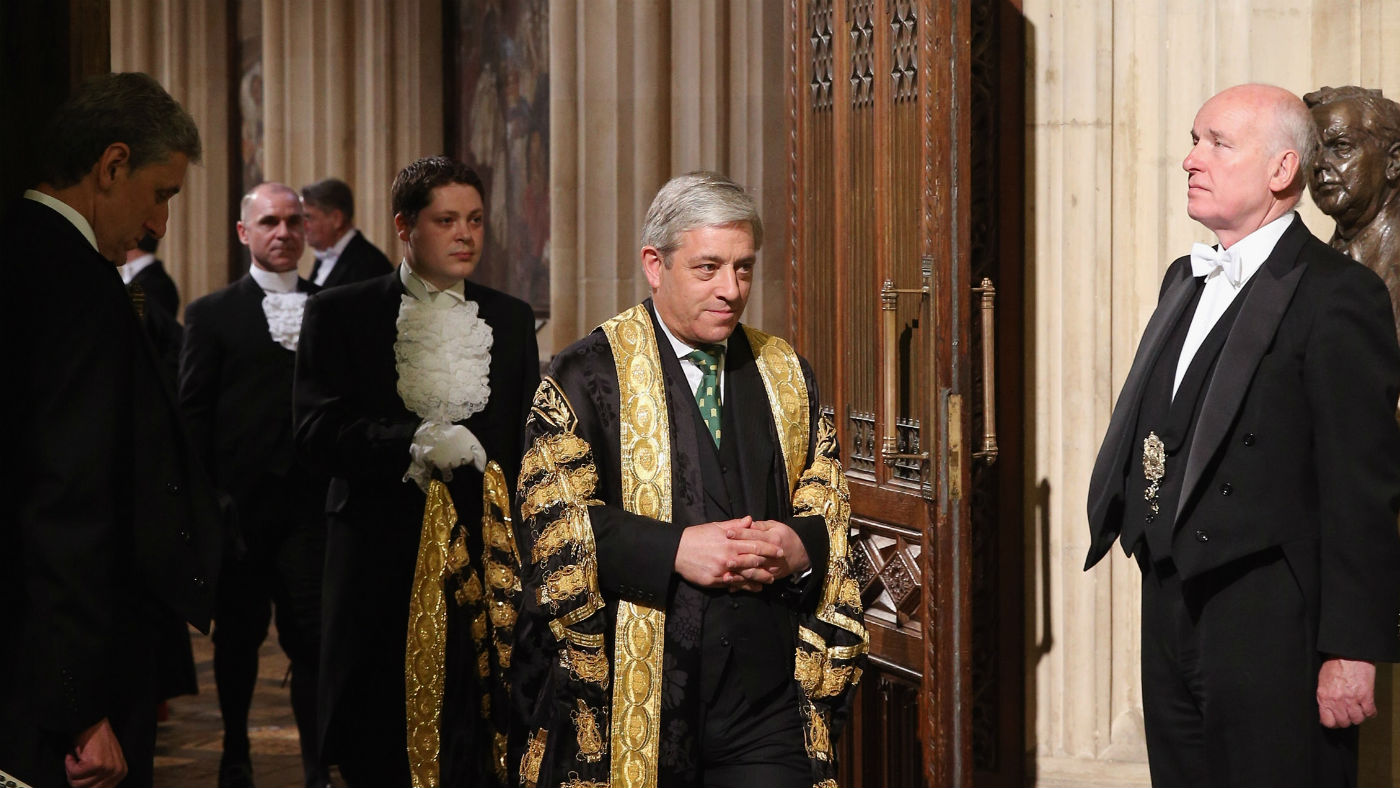What powers does the House of Commons speaker have?
John Bercow angers Brexiteers by rejecting Boris Johnson’s request for simple vote on deal

A free daily email with the biggest news stories of the day – and the best features from TheWeek.com
You are now subscribed
Your newsletter sign-up was successful
John Bercow is making the most of his final days as the House of Commons speaker to exercise his powers over MPs battling about Brexit.
The speaker, who will step down next week, was accused of bias yesterday by Brexiteer MPs as he rejected the government’s request for a simple “yes” or “no” vote on its Brexit deal.
Bercow said it would be “repetitive and disorderly” to debate the motion again after it was brought before Parliament on Saturday.
The Week
Escape your echo chamber. Get the facts behind the news, plus analysis from multiple perspectives.

Sign up for The Week's Free Newsletters
From our morning news briefing to a weekly Good News Newsletter, get the best of The Week delivered directly to your inbox.
From our morning news briefing to a weekly Good News Newsletter, get the best of The Week delivered directly to your inbox.
A spokesperson for the PM responded that “the speaker has yet again denied us a chance to deliver on the will of British people”, while Tory Leaver Sir Bernard Jenkin told Bercow that it was “remarkable how often you please one lot and not the other”.
So what exactly is the speaker entitled to do?
What is the speaker’s role?
To ensure the orderly flow of business, the House of Commons observes parliamentary rules and traditions, both written and unwritten. It is the speaker's duty to interpret these rules impartially, to maintain order, and to defend the rights and privileges of MPs, particularly backbenchers.
A free daily email with the biggest news stories of the day – and the best features from TheWeek.com
The speaker controls debates in the Commons, deciding who can speak, and can - although rare - exercise a casting vote in the event of a draw. The speaker has significant influence on legislation by selecting which amendments to a bill may be proposed, and by interpreting and enforcing the rules of Parliament as laid out in the official parliamentary rulebook, Erskine May.
Originally, the speaker was the monarch’s de facto representative in Parliament. From the 18th century onwards, the speaker gained greater independence, beginning to represent the collective voice of Parliament. Now, “the modern speaker is politically impartial and expected to avoid taking a political stance or favouring particular interests over others”, says the Institute for Government.
Although the speaker is still a serving MP, with constituency work, they are expected to resign from their party and avoid campaigning in elections on appointment.
How is the speaker selected?
The speaker is elected by a secret ballot of MPs at the beginning of a new Parliament, usually following a general election or the resignation, death or retirement of the previous incumbent.
More than 150 people have served as speaker of the House of Commons. Betty Boothroyd, elected in 1992, was the first female speaker. Michael Martin, elected in 2000, was the first Roman Catholic to hold the office since the Reformation, while Bercow, elected in 2009, is the first Jewish speaker.
If the speaker in post wishes to retain the role following a general election, they do not need to be re-elected by secret ballot and can instead be reappointed by a motion passed by a majority of MPs.
–––––––––––––––––––––––––––––––For more political analysis - and a concise, refreshing and balanced take on the week’s news agenda - try The Week magazine. Get your first six issues free–––––––––––––––––––––––––––––––
Why is Bercow so controversial?
“Read interviews with John Bercow and it’s clear how he sees his role today - making sure no political party disrespects Parliament by bending or breaking the rules,” says the BBC’s Chris Smith.
During his ten years in the speaker’s chair, Bercow has clashed with four prime ministers, survived attempts to oust him and spoken out against US President Donald Trump. But the majority of criticism of Bercow has come over Brexit, in particular over the perception of him as a Remainer.
He has been willing to enable MPs to exert authority over the government and hold it to account, by allowing more emergency debates and amendments from backbenchers. Bercow stopped the government from repeating votes on the terms of Brexit under Theresa May and has now ruled out another debate on Boris Johnson’s Brexit deal.
But “he is not without his advocates, even among hard-line Brexiteers”, says Politico.
Bercow, who will stand down on 31 October, has said it is not his job to be “cheerleader for the executive branch” but rather to “stand up for the rights of the House of Commons”, adding that the abuse he gets for it is “water off a duck’s back as far as I am concerned”.